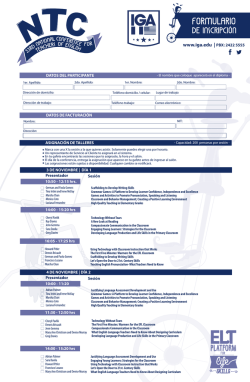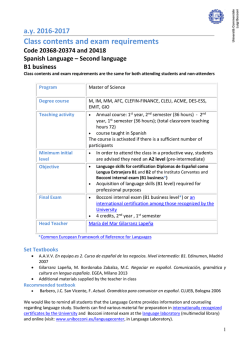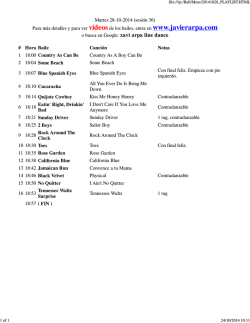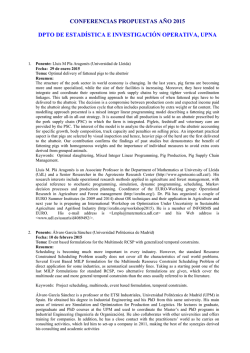
B1 business - Bocconi University
a.y. 2015‐2016 Class contents and exam requirements Code 20368‐20374 and 20418 Spanish Language – Second language B1 business Class contents and exam requirements are the same for both attending students and non‐attenders Program Master of Science Degree course M, IM, MM, AFC, CLAPI, CLEFIN‐FINANCE, CLELI, ACME, DES‐ ESS, EMIT, GIO Teaching activity Minimum initial level In order to attend the class in a productive way, students are advised they need an A2 level (pre‐intermediate) Objective Language skills for certification Diplomas de Español como Lengua Extranjera B1 and B2 of the Instituto Cervantes and Bocconi internal exam (B1 business*) Acquisition of language skills (B1 level) required for professional purposes Bocconi internal exam (B1 business level*) or an international certification among those recognized by the University 4 credits, 2nd year , 1st semester Final Exam Annual course: 1st year, 2nd semester (36 hours) ‐ 2nd year, 1st semester (36 hours); (total classroom teaching hours 72) courses taught in Spanish The course is activated if there is a sufficient number of participants Head Teacher María del Mar Gilarranz Lapeña *Common European Framework of Reference for Languages Set Textbook Prost, G. Noriega Fernández, A. Al di@. Curso intermedio de español para los negocios. Libro del Alumno. SGEL, Madrid 2009 Gilarranz Lapeña, M. Bordonaba Zabalza, M.C. Negociar en español. Comunicación, gramática y cultura en lengua española. EGEA, Milano 2013 Recommended textbooks Barbero, J.C. San Vicente, F. Actual. Gramática para comunicar en español. CLUEB, Bologna 2006 We would like to remind all students that the Language Centre provides information and counseling regarding language study. Students can find various material for preparation in internationally recognized certificates by the University and Bocconi internal exam at the language laboratory (multimedial library) and online (visit: www.unibocconi.eu/languagecenter, in Language Laboratory). 1 Resources Materials prepared by professors Self‐study programme Past exams Extra teaching materials Language tutors Office Hours for Bocconi teachers International certificates recognized Classroom activities & skills Teaching intends to promote the acquisition of professional language skills. In particular, the following will be treated through topics covered in the textbook: extension of business vocabulary development of listening, reading, speaking and writing skills. Tasks will be set individually or in small groups, at times requiring presentations to the whole class; editing professional documents (formal letter, e‐mail, report) mock exam simulation for internal examination and for international certificates (Diploma de Español como Lengua Extranjera B1 and B2 of the Instituto Cervantes) grammar revision Self‐Study activities & skills In order to acquire language skills and to prepare correctly for the Bocconi exam, it is important to attend lessons regularly as well as to follow a self‐study program. To reach this objective a series of activities are indicated to be carried out from the textbooks and self‐ study modules available on the e‐learning platform. In the Library you can find materials (including past exam) provided by the class professor. It is suggested to dedicate 3‐5 hours weekly for independent study. 2nd SEMESTER (February – May ) Topic/Units 1 La responsabilidad empresarial Economía social en España. La empresa. El Pacto Mundial. Grammar/Skills Presente de Indicativo Pretérito Imperfecto y Perfecto Participio pasado Ser / estar La obligación Self‐Study program* (see textbooks) Negociar en español Contenidos gramaticales: Unidad 1, 5, 6, 7; Presente Indicativo, regular p. 18. e irregular, p.87. Unidad 2, 3; Verbos ser y estar, p.31. Unidad 8; la obligación, p.113. Unidad 12, 13; Imperfecto, p.169. y Perfecto, p.157. AVE: Nivel B1. Tema 1. Sesión 3. Tema 2. Sesión 3, 4. . Nivel B1.1.Tema 1. Sesión 2, 3, 4. Tema 3. Sesión 3. Tema 4. Sesión 2. Mat. Complementario B1.1 Ficha 3. 2 2 El desarrollo sostenible Energías para el futuro. La política medioambiental. El patrimonio cultural de la humanidad. Presente Subjuntivo. Usos del Subjuntivo Futuro Indicativo. Usos El superlativo Muy / Mucho 3 En los mercados exteriores IBERIA Internacionalización y Expatriación Seleccionar candidatos Pretérito Indefinido y Pluscuamperfecto Cambios ortográficos La forma progresiva La concesión. Aunque 4 Empresas y Imperativo Globalización Los pronombres personales La empresa multicultural. Uso de los pronombres con el imperativo Negociar con extranjeros. Temporales El viaje de negocios. Nivel B1.3.Tema 7. Sesión 1. Nivel B1 3.4. Tema 7. Sesión 1. Tema 9. Sesión 1. Tema 11. Sesión 1. Negociar en español Contenidos gramaticales: Unidad 3; Muy Mucho, p.55. Unidad 10; Comparativos y superlativos, p.135. Unidad 11; Futuro, p.147. Unidad 16; Presente Subjuntivo, 201. AVE: Nivel B1. Tema 2. Sesión 9. Tema 3. Sesión 7. Mat. Complementario B1.1 Ficha 24, 25. Nivel B1.1. Tema 1. Sesión 6, 3. Tema 3. Sesión 3. Tema 2. Sesión 9. Tema 3. Sesión 7. Tema 4. Sesión 1, 8. Tema 5. Sesión 1, 9. Tema 6. Sesión 1, 5. Mat. Complementario B1.2 Ficha 1, 5, 6. Nivel B1.1.2. Tema 4. Sesión 1, 5, 9. Nivel B1.3. Tema 7. Sesión 1, 3. Tema 9. Sesión 5, 6, 7, 8. Nivel B1 3.4. Tema 7. Sesión 4, 8. Tema 9. Sesión 3, 4. Negociar en español Contenidos gramaticales: Unidad 8, 9; Forma Progresiva, p.113. Unidad 13, 14; Indefinido, p.177. y Pluscuamperfecto, p.172. AVE: Nivel B1. Tema 2. Sesión 1, 3, 4, 5, 7. Tema 3. Sesión de 1 a 6. Mat. Complementario B1.1 Ficha 9, 10, 11, 12, 13, 15, 19, 20. Nivel B1.1. Tema 2. Sesión 1, 2, 4, 5,6,7. Nivel B1 3.4. Tema 11. Sesión 6. Nivel B1.4.Tema 11. Sesión 6. Negociar en español Contenidos gramaticales: Unidad 18; Imperativo, p.229. Unidad 19; Temporales, p.244. 3 AVE: Nivel B1. Tema 2. Sesión 4. Nivel B1.1.Tema 1. Sesión 2. Tema 4. Sesión 3. Tema 6. Sesión 3. Material Complementario B1.2. Ficha 16. Nivel B1.2. Tema 4. Sesión 3. Tema 6. Sesión 3. Nivel B1 3.4. Tema 10. Sesión 8. Tema 11. Sesión 7, 8. Nivel B1.4. Tema 10. Sesión 8. Tema 11. Sesión 7, 8. 1st SEMESTER (September – December) 5 Liderando empresas EL liderazgo y los líderes El Blog La nueva España Condicional. Usos. Futuro perfecto. La probabilidad Por y Para 6 ¡A ganar mercados! El éxito en los negocios. El consumo y los consumidores El turismo español. Imperfecto de Subjuntivo Tiempos compuestos. Correspondencias temporales. Oraciones condicionales. Quisiera Negociar en español Contenidos gramaticales: Unidad 8; Para y Por, p.115. Unidad 15; Condicionales y probabilidad, p.193. AVE: Nivel B1. Tema 3. Sesión 8. Material Complementario B1.1. Fichas 26, 27. Nivel B1.1.Tema 3. Sesión 8. Tema 4. Sesión 4. Tema 5. Sesiones 4, 8. Tema 6. Sesión 2, 5, 8. Material Complementario B1.2. Ficha 20. Nivel B1.2. Tema 5. Sesión 4, 8. Tema 6. Sesión 2. Nivel B1 3. Tema 8. Sesión 2. Nivel B1.3.4. Tema 9. Sesión 2. Negociar en español Contenidos gramaticales: Unidad 20; Imperfecto, p.249., Pluscuamperfecto, p.253., Perfecto, p.251. Subjuntivo AVE: Nivel B1.2. Tema 4. Sesión 4. Nivel B1 3. Tema 8. Sesión 1,3, 4, 6, 7, 8, 9. Nivel B1 3.4. Tema 9. Sesión 6, 7, 8. Tema 10. Sesiones 2, 3, 4, 6, 7. Tema 11. Sesión 2 Tema 12. Sesión 2, 3, 5, 6, 7, 8, 9. Nivel B1.4. Tema 10. Sesión 1, 2, 3, 4 4, 6. Tema 11. Sesión 1, 2, 4. Tema 12. Sesión 2, 3, 6, 8, 9. 7 Cada día más Experiencia Motivar a los El estilo indirecto empleados La impersonalidad Marcas líder en América La forma Pasiva Latina Pero, sino, sino que Emprendedores Latinoamericanos 8 Juntos se puede La mujer en el trabajo Europa y América Latina Las nuevas tecnologías Consecutivas y Causales Ser / estar Como si Oraciones reduplicativas Negociar en español Contenidos gramaticales: Unidad 19; Voz Pasiva, p.241. Unidad 22; Estilo Indirecto, p.275. AVE: Nivel B1. Tema 2. Sesión 8. Mat. Complementario B1.1.Ficha 7, 23. Nivel B1.1. Tema 1. Sesión 5. Tema 2. Sesión 8. Tema 3. Sesión 5. Tema 4. Sesión 6. Nivel B1.2. Tema 4. Sesión 1,7. Nivel B1 3. Tema 7. Sesión 9. Tema 9. Sesión 4. Nivel B1 3.4. Tema 9. Sesión 4. Negociar en español Contenidos gramaticales: Unidad 16, 17; Sustantivas Relativas, p.220. AVE: Nivel B1. Tema 3. Sesión 3. Nivel B1.1. Tema 4. Sesión 4, 5,7. Mat. Complementario B1.2. Ficha 4. Nivel B1.2. Tema 4. Sesión 2, 5.. Nivel B1 3. Tema 7. Sesión 5, 6. Tema 8. Sesión 5. Nivel B1 3.4. Tema 7. Sesión 5. Tema 9. Sesión 5. Nivel B1.4.5. Tema 10. Sesión 9. Exam content and description Objectives The exam is scored out of a maximum of 30 points, which will go into the calculation of your grade point average, and evaluates your ability to: understand fairly long and complex listening passages, making notes and reworking the information heard write structured texts of various types according to instructions oral interaction: presentation and discussion demonstrate your knowledge of the language, by correctly using a range of vocabulary and grammatical structures 5 Exam Terms The exam consists of two compulsory parts: a written test and an oral test. In order to sit for exams, both written and oral, it is necessary to enroll for the exam through Punto Blu. Both tests must be successful for the exam to be recorded. For the written test: the written test can be taken again before sitting for the oral test the handing in of the exam paper makes the previous written exam taken null For the oral test: it can only be taken if the written test has been successful (minimum mark: 18/30) it can only be taken within the validity terms of the written test (see section Written Exam, Validity) it involves the preparation of the content and any materials as indicated in the program (see section Oral exam, Test) it brings the mark of the written part up to date to define the final grade (see section Oral Exam, Final grade) Written exam First part Objective Test Second part Objective Test Third part Objective Listening to two passages – monologues, dialogues, discussion, surveys – containing data, opinions, descriptions, explanations To test: understanding of oral texts, appropriately discerning information and data 1. listening: true/false questions 5/30 2. listening: multiple choice answers 5/30 Reading comprehension of two authentic texts, possibly also containing graphs, tables, images Checking candidates’: ‐ ability to understand texts ‐ knowledge of the language 1. True/false questions or multiple choice answers 2. Grammar and vocabulary exercises in the following formats: multiple choice answers, sentence completion, sentence transformation Writing two texts according to the instructions given 5/30 5/30 To test: content processing and drafting of texts appropriate for a professional context Duration 5/30 1. Writing two professional documents according to the instructions given, from a personal point of view 5/30 150 minutes Dictionary Bilingual dictionary can be used Validity it is valid for the 3 subsequent oral exams, and it is also valid for the subsequent 12 months but there is a penalty that must be paid (see Oral Exam, Final grade) Test Oral exam Objective Introduce and discuss on a socio economic topic of a popular nature, answering questions asked by the examiner 6 Skill Presentation and discussion Test During the oral test the student will be first required to read an article of socio‐ economic nature from the Spanish press and then to report on and discuss the topic of the article with the teacher. The article will be provided by the examiner during the exam Duration 15 minutes Dictionary Dictionaries are not allowed Final grade The oral exam can only be taken once you have passed the written exam. Students will be assessed in terms of their practical ability to communicate. During the oral exam marks can be added to or subtracted from the written exam result in the following way: by +3 or ‐3, if the oral exam is passed within the 3 oral exams subsequent to the written exam; by +1 or ‐3, if the oral exam is passed after the first 3 subsequent oral exams, but still by 12 months subsequent to the written exam As an alternative to the Bocconi exam, students may choose to register one of the international certifications recognized by the University. The achieved result is converted into a number grade out of a possible thirty and is registered in the academic career. Additional Points The assessment of language skills depends both on the result of the final exam and on marks awarded during the year: 1. Positive participation in the course and completion of self‐study activities 2. Partial Exam 3. The exam passed the first time it is taken Points are registered at the same time the oral exam is passed 1. Positive participation in the course and completion of self‐study activities Objective To encourage constant and active improvement in the language Maximum points 2 thirtieth: 1 thirtieth for each semester of teaching for active participation awardable in at least 75% of lesson hours + completion of the self‐study programme Defined by professor at the end of the course on the basis of quality of work Assignment of performed and respected due dates as indicated the professor in the classroom points and also online From January to the September immediately following the course. These months Validity are included 2. Partial Exam Objective Evaluate progress in language learning Skills: Grammar – Grammar exercises in the following formats: multiple choice Test answers, sentence completion, sentence transformation Vocabulary exercises in the following formats: sentence completion, cloze test, multiple choice answers 7 Duration 60 minutes Dictionary Maximum points awardable Assignment of points Dictionaries are not allowed 0.5 thirtieth is awarded on the condition that students pass their final written and oral exam within the first or second scheduled exam session Validity Note Determined by the teacher after a “pass” grade has been achieved From January to the February immediately following the course. These months are included The exam is open to all students, both attenders and non‐attenders enrolled in the first year of their Degree course. It takes place once every academic year in June after first semester classes have finished (the exact date can be found in the General Exams calendar) 3. The exam passed the first time it is taken Objective Reward students who sit for the exam only when really well prepared Maximum points awardable Assignment of points 0.5 thirtieth The attribution of points is automatic when the student enrolls for and hands in the written exam for the first time; passes it (minimum score 18/30) and takes the oral exam on the first date immediately available after the written exam 8
© Copyright 2026



